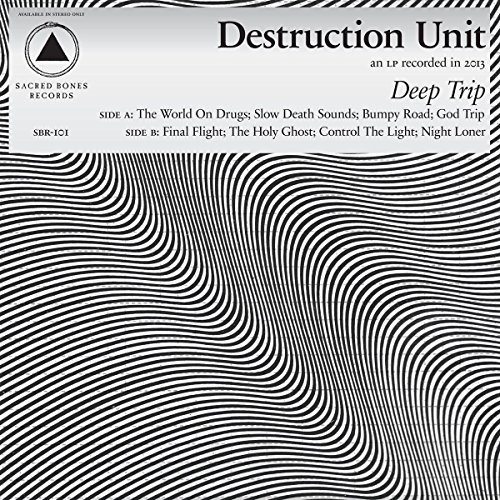
Destruction Unit
Deep Trip
Release Date: Aug 20, 2013
Genre(s): Pop/Rock, Alternative/Indie Rock, Garage Punk, Neo-Psychedelia, Noise-Rock
Record label: Sacred Bones
Music Critic Score
How the Music Critic Score works
Buy Deep Trip from Amazon
Album Review: Deep Trip by Destruction Unit
Very Good, Based on 8 Critics
Based on rating 8/10
Listening to Destruction Unit's Deep Trip, it's easy to imagine that, in the moment you push play, a sonic dam is demolished, releasing an unstoppable torrent of psychedelic noise whose only goal is to pour over everything in its path. Blown out and busy, the album delivers something that feels more wave of sound than wall of sound, continually crashing and building back up into a monumental and relentless force. Despite its heaviness, though, there's something oddly soothing about Deep Trip.
Based on rating 4
Destruction Unit are here for one thing only: they want to make your ears bleed. The Arizona desert-dwelling noise connoisseurs have been knocking around in one form or another for over a decade now (starting off, somewhat improbably, as frontman Ryan Rousseau’s solo synth-punk outfit; the late Jay Reatard turned up in one early incarnation), hopping from genre to genre, label to label. But at last Rousseau seems to have settled on his line-up – and his sound.
Based on rating 7.4/10
There’s a chapter in Mark Barrowcliffe’s 2007 memoir The Elfish Gene: Dungeons, Dragons and Growing Up Strange in which the author recounts the time in the late 70s when he stopped listening to punk-- the cool music of his native England at the time-- and got into Hawkwind instead. Hawkwind, so his teenaged self reasoned, was more conducive to his Dungeons & Dragons lifestyle and its fixation on all things mystic, cosmic, and denim-jacketed. Punk was about confrontation; Hawkwind was about escapism.
Based on rating 7/10
Brooklyn label Sacred Bones keeps releasing powerful psychedelic albums from groups reared on classic, indie, and hard rock. Songs opt for brevity. Vocals roar and whine, but without the deeper registers associated with metal today. Guitars, bass, drums thump and thud in a maelstrom. That ….
Based on rating C+
The bone-dry, sun-scorched terrain of the Arizona desert might not seem like your typical breeding ground for good rock ‘n’ roll. But in the case of Destruction Unit, the backdrop perfectly suits the scathing brand of far-gone, noisy psychedelia they tamper with. Mesa is a far cry from New York’s calculated bohemian cool and L.A.’s flair for posh pretense, and it has something completely antithetical working in its favor: the creativity that can be born out of the stagnancy of life in the desert.
Opinion: Fantastic
Destruction Unit Deep Trip (Sacred Bones) Arizona's Destruction Unit gets a lot of credit for its ability to burn shit down. It's understandable – turbine guitars, spiked drums, and backlit vocals – but there's a hypnotic, almost soothing quality to the music. Deep Trip stands as the quartet's first proper studio album after a litany of cassettes and singles, and it embraces the warm void more than ever before.
Opinion: Very Good
Destruction Unit – Deep Trip (Sacred Bones)Destruction Unit plays dense, messy, guitar-sludged punk. Its front line— three guitar players—crank out exactly the sort of chaotic dissonance you’d expect of guys shoehorned into a tiny room, slashing and jousting to get across three different takes on exactly how a song should come off. The songs then are always rampaging off the track, barreling at top speed and top volume around corners, through genres, into and out of trouble.
Opinion: Average
Starter for ten. Who was it who said "Natural law dictates that each of us be left the freedom to do as we will with our desire, our soul, and our body, as well as with that stuff known as 'drugs'"? While it sounds like an excerpt from one of Bill Hicks' routines about the arbitrariness of legislating the ways consciousness might be altered, the answer is actually French philosopher and literary critic Jacques Derrida, speaking in a 1989 interview about the semantic instability of the drugs debate. It's Derrida's own rhetoric, though, which is perhaps most telling here, in as much as it makes explicit a conceptual link between drug use and something called 'freedom', a syllogism which has inhered in popular music since at least the 1950s.
'Deep Trip'
is available now

